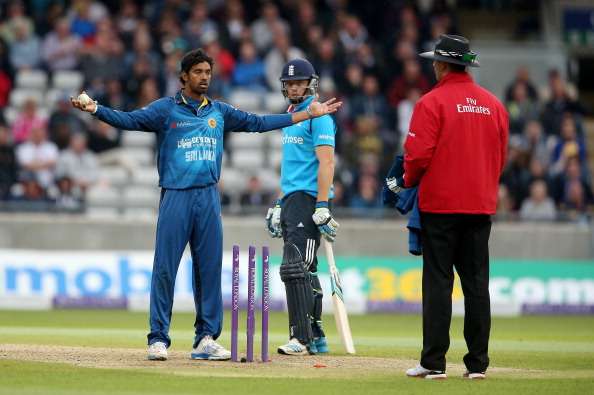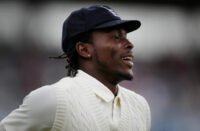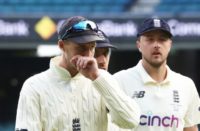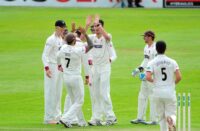Stand by for the resumption of the second-longest running feud in world cricket. When England take on Sri Lanka in the first Test of the summer at Headingley on Thursday, they will do so led by the former coaching partnership of their opponents, Trevor Bayliss and Paul Farbrace.
Recently, they enlisted the help of one of the island nation’s greatest batsmen, Mahela Jayawardene, as a World T20 coaching consultant. Another, Kumar Sangakkara, has always been a popular and respected figure here and he is currently spreading the benefit of his vast experience over the Surrey dressing room and, for nearly two decades, as much as Muttiah Muralitharan terrorised England batsmen with the ball, so he also beguiled them with his vast smile.
Yet, as events on their last visit here in 2014 remind us, often when these two teams stand toe to toe, tension seems to be bubbling just under the surface and an eruption is often just a word, look or action away. Some suggest that one of the underlying causes of all the aggro here two summers ago was Sri Lanka’s irritation at losing Farbrace to England just days before the start of the tour two summers ago.
Whether that played a part or not, the fire took hold when, on the eve of the fifth one-day international in Birmingham, they were made aware that the action of Sachithra Senanayake had been called into question for the second time in his career. It was further fuelled by the suggestion, later hotly denied, that England may have raised the issue behind the scenes. Then, with England struggling, Senanayake made sure his name would be headline news one way or another when he ran out Jos Buttler at the non-striker’s end, only the fourth case of ‘Mankading’ in ODI history.
Bowler and skipper Angelo Matthews insisted the bowler had been well within his rights to nick off the bails as Buttler left his crease, Matthews claiming the batsman had been trying to gain an unfair advantage as he had done so repeatedly during his barnstorming 121 in the previous match at Lord’s and that he had been warned twice. His England counterpart Alastair Cook, on the other hand, was having none of it.
“A pretty poor act,” said Cook, continuing, “There’s a line and that line was crossed here,” something he no doubt made clear to Matthews as the two exchanged angry words when shaking hands at the end of the match. And most observers, including the umpires, thought that line was again overstepped, by both sides, in the second Test at Headingley.
Cook had raised the temperature on the eve of the match when, replying to questions about Senanayake’s bowling, he said: “Everyone saw his action and I think concerns were raised. You only had to watch TV.”
Then, apparently responding to something Joe Root said to him as he and England were engaged in what was ultimately a narrow failure to save the match and the series, Matthews rounded on the Yorkshire batsman in a sustained barrage of sledging so pointed and ill-tempered that the umpires Billy Bowden and Steve Davis were forced to step in.
When James Anderson fell from the penultimate ball of the match to give Sri Lanka their first series win here, the wild exuberance of their celebrations echoed the words of Jayawardene that the controversy over the bowling action of their young off-spinner had been a big motivating factor for them.
Cue Murali.
Although questions had been raised before and, indeed, Murali had already been called for chucking in Test and ODI cricket, David ‘Bumble’ Lloyd was the first England representative to go public on the matter, when, as coach, he cast doubts on the legality of his action following their defeat to Sri Lanka in the Oval Test of 1998.
Initially, however, the England ODI players taking part in the triangular series Down Under that winter were mere bewildered bystanders in the most spectacular controversy concerning the most controversial action of all time when, after Murali had been called for chucking by Aussie umpire Ross Emerson during their match against Arjuna Ranatunga’s side at the Adelaide Oval, the Sri Lankan captain responded by threatening to take his players from the field.
But, later, after the match had been restarted, tempers frayed and ugly scenes followed, first when the England captain and keeper Alec Stewart accused the batsman Ranatunga of deliberately trying to unsight him by standing between him and the thrower in the field.
“You’ve caused enough chaos today with your behaviour,” said Stewart, “so please try and drag it back a little bit. Right? Enough said. Your behaviour today has been appalling for a country captain.”
This was followed by Darren Gough bumping into Roshan Mahanama when he tried to run him out, next feigning a head-butt at him and finally Stewart brushing shoulders with the Sri Lankan batsman as he walked past him in mid-pitch.
After Murali, of all people, had scored the winning runs, Stewart refused to shake hands with his opponents and Nasser Hussain, writing in his autobiography, commented: “It was like the beginning of our love-hate relationship with the Sri Lankans, which has been short on love.”
Briefly, the two sets of players were united in their condemnation of the local umpire BC ‘Bad Call’ Cooray and South African Rudi Koertzen in the second Test of the 2001 series in Kandy, which came to a head when Sanath Jayasuriya was given out first ball caught at slip by Graham Thorpe even though he had smashed it into the ground.
“Even we were a bit embarrassed about that one,” admitted Stewart.
But for the rest of the match it had been business as usual, with Hussain welcoming Murali to the crease with the words: “Let’s get this f*****g chucker out!” and the enmity resurfacing when Mike Atherton and Sangakarra squared up to each other for a session of heated finger-wagging after the England man claimed Sangakkara called him and his team cheats.
Between then and 2014 flashpoints were, mercifully, rare, though former captain Michael Vaughan did his best to crank up the volume by describing Sri Lanka as the worst sledgers in world cricket, then, after retiring to the world of punditry, causing a Twitter storm when he made disparaging remarks about the length and the musical merit of their pre-match national anthem, during which, he claimed, he had “rung home, made a brew, been to the toilet and baked a cake”.
One theme appears to be constant, however. While England regularly seem to come off second best following such argy-bargy, from Ranatunga, to Murali to Mahela to Matthews, it seems to stiffen the competitive edge of their opponents no end.
And, as they attempt to pay Sri Lanka back for the historic defeat inflicted upon them two summers ago, perhaps that might be worthy of their consideration.
This piece originally featured in The Cricket Paper, Friday May 13 2016












